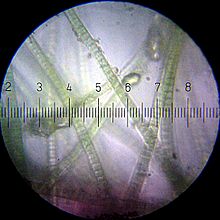Fiksasi karbon

Fiksasi karbon, pengikatan karbon, atau asimilasi karbon mengacu pada proses konversi karbon anorganik (karbon dioksida) menjadi senyawa organik oleh organisme hidup. Contoh yang paling menonjol adalah fotosintesis, meskipun kemosintesis adalah bentuk lain dari fiksasi karbon yang dapat terjadi tanpa adanya sinar matahari. Organisme yang tumbuh dengan memfiksasi karbon disebut autotrof. Autotrof termasuk fotoautotrof, yang mensintesis senyawa organik menggunakan energi sinar matahari, dan litoautotrof, yang mensintesis senyawa organik menggunakan energi dari oksidasi anorganik. Heterotrof adalah organisme yang tumbuh menggunakan karbon yang difiksasi oleh autotrof. Senyawa organik digunakan oleh heterotrof untuk menghasilkan energi dan untuk membangun struktur tubuh. "Karbon terfiksasi", "karbon tereduksi", dan "karbon organik" adalah istilah yang setara untuk berbagai senyawa organik.[1]
Referensi
[sunting | sunting sumber]- ^ Geider, R. J., et al., "Primary productivity of planet earth: biological determinants and physical constraints in terrestrial and aquatic habitats", Global Change Biol. 2001, 7, 849-882. doi:10.1046/j.1365-2486.2001.00448.x
Bacaan lebih lanjut
[sunting | sunting sumber]- Berg IA (2011). "Ecological aspects of the distribution of different autotrophic CO2 fixation pathways". Appl. Environ. Microbiol. 77 (6): 1925–36. doi:10.1128/AEM.02473-10. PMC 3067309
 . PMID 21216907.
. PMID 21216907.
Descent of plants and algae
[sunting | sunting sumber]- Keeling PJ (2004). "Diversity and evolutionary history of plastids and their hosts". Am. J. Bot. 91 (10): 1481–93. doi:10.3732/ajb.91.10.1481. PMID 21652304.
- Keeling PJ (2009). "Chromalveolates and the evolution of plastids by secondary endosymbiosis" (PDF). J. Eukaryot. Microbiol. 56 (1): 1–8. doi:10.1111/j.1550-7408.2008.00371.x. PMID 19335769. Diarsipkan dari versi asli (PDF) tanggal 2009-07-09. Diakses tanggal 10 April 2012.
- Keeling PJ (2010). "The endosymbiotic origin, diversification and fate of plastids". Philos. Trans. R. Soc. Lond., B, Biol. Sci. 365 (1541): 729–48. doi:10.1098/rstb.2009.0103. PMC 2817223
 . PMID 20124341.
. PMID 20124341.
- Timme RE, Bachvaroff TR, Delwiche CF (2012). "Broad phylogenomic sampling and the sister lineage of land plants". PLoS ONE. 7 (1): e29696. Bibcode:2012PLoSO...7E9696T. doi:10.1371/journal.pone.0029696. PMC 3258253
 . PMID 22253761.
. PMID 22253761.
- Spiegel FW (2012). "Evolution. Contemplating the first Plantae". Science. 335 (6070): 809–10. Bibcode:2012Sci...335..809S. doi:10.1126/science.1218515. PMID 22344435.
- Price DC, Chan CX, Yoon HS, Yang EC, Qiu H, Weber AP, Schwacke R, Gross J, Blouin NA, Lane C, Reyes-Prieto A, Durnford DG, Neilson JA, Lang BF, Burger G, Steiner JM, Löffelhardt W, Meuser JE, Posewitz MC, Ball S, Arias MC, Henrissat B, Coutinho PM, Rensing SA, Symeonidi A, Doddapaneni H, Green BR, Rajah VD, Boore J, Bhattacharya D. (2012). "Cyanophora paradoxa genome elucidates origin of photosynthesis in algae and plants" (PDF). Science. 335 (6070): 843–7. Bibcode:2012Sci...335..843P. doi:10.1126/science.1213561. PMID 22344442. Diarsipkan dari versi asli (PDF) tanggal 2013-05-14. Diakses tanggal 10 April 2012.
